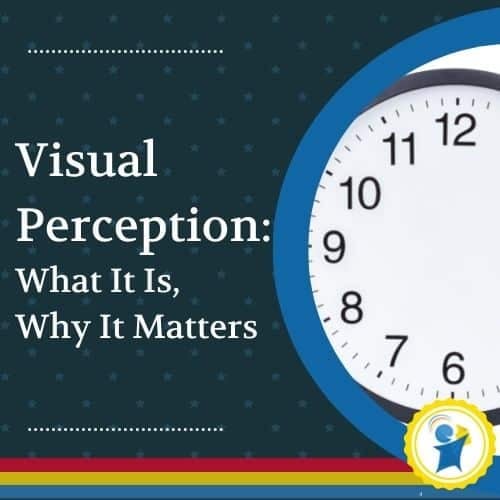
Visual perception and visual processing are often used interchangeably and refer to the brain’s ability to understand what the eyes see. Learn more about visual perception, why it matters, visual perceptual deficits, and overcoming deficits.
.
Table of contents:
- Introduction
- What is perception?
- What is visual perception?
- Why is visual perception important?
- What are visual perception problems?
- Overcoming deficits in visual perception
- Key takeaways
Introduction
We make contact with the world around us through our five primary senses — sight, hearing, touch, smell, and taste. However, psychologists distinguish between sensation and perception.
Sensation is the pickup of information by our sensory receptors, for example, the eyes, ears, skin, nostrils, and tongue. In hearing, sensation occurs as waves of pulsating air are collected by the outer ear and transmitted through the bones of the middle ear to the cochlear nerve. In vision, sensation occurs as rays of light are collected by the two eyes and focused on the retina.
What is perception?
Perception is concerned with the interpretation of what is sensed. As you read these lines, perhaps the smell of the finished dinner is pouring out of the oven into your nose; perhaps you are hearing a dog barking in the neighborhood; maybe you are feeling some warming rays of sunlight on your skin. You might be looking at the image above and interpret it as part of a clock face, even though the hour and minute hands are missing. A corresponding perception can cause the brain to react, if necessary, for example, to the perception of something burning in the oven. These are all examples of how visual perception is used in everyday life.
Interpretation of sensory phenomena can only be made based on past experiences of the same, similar, or related phenomena. Perceptual ability, therefore, heavily depends upon the amount of perceptual practice and experience a person has already enjoyed. For example, an illiterate person would not be able to group the lines in the image on the right in the same way and complete the missing lines as you who can read them. Thus, a lack of experience may cause people to misinterpret what they have seen. In other words, perception represents our apprehension of a present situation in terms of our past experiences, or, as stated by the philosopher Immanuel Kant (1724-1804): “We see things not as they are but as we are.”
What is visual perception?
Visual perception refers to the brain’s ability to understand what one sees. Kurtz (2006) defines visual perception as the cognitive component of interpreting visual stimuli. It involves the ability to mentally manipulate visual information as needed to solve problems and to take action in response to environmental demands.
Why is visual perception important?
Visual perception is a highly critical component of a child’s learning. Children with visual perception problems have trouble recognizing, remembering, and organizing visual images as needed to understand written and pictorial symbols, which can interfere with many aspects of daily living, most notably learning to read, write, and do math.
Recent studies have linked visual perception to dyslexia and dyscalculia. Some studies have reported visual perception deficits as components of dyslexia (Goswami et al., 2010; Stefanics et al., 2011; Vidyasagar & Pammer, 2010; Zhao et al., 2014), while others have associated visual perception deficits with dyscalculia (Sigmundsson et al., 2010; Zhou & Cheng, 2015).
Szűcs and team (2013) set out to compare various potential theories of dyscalculia in more than a thousand 9-year-old children. The researchers found that children with dyscalculia showed poor visuospatial memory performance. For example, they struggled to remember the locations of items in a spatial grid.
What are visual perception problems?
There are many different types of vision problems that may occur in children. Some are caused by physical abnormalities of the eyes or their related structures. These may be present at birth or caused by injury or illness and are referred to as structural vision problems. Other vision difficulties are caused by problems that affect the efficiency of the visual system. These are referred to as functional vision problems.
Even if the visual system is physically intact and works efficiently, the brain must interpret visual information correctly. A reduced ability to make sense of information taken in through the eyes is called visual perception problems, visual perception deficits, or visual processing disorder.
Visual perception problems often co-exist with structural or functional vision disorders but also commonly occur in children without these disorders. For example, children with good eyesight, with developmental delays and learning disabilities, may demonstrate problems with visual perception (Kurtz, 2006).
Below are examples of visual perception skills required for learning and how deficits may interfere with learning:
- Visual figure-ground discrimination allows the child to separate foreground from background to attend to the relevant details. It allows the child to focus quickly on the most important aspects of the visual image while retaining an awareness of the relationships of parts to the whole image.
Children with problems in this area may have difficulty reading when there are too many words or other images on a page. As a result, they frequently lose their place while reading.
In math, figure-ground problems may cause difficulties in keeping individual problems separate. The student may lose their place on a worksheet, confuse problem numbers with digits in the problem itself or not finish the problem.

- Form discrimination: Whether it be the differentiation of the shape of a circle from a square, or the letter B from P, the ability to perceive the shapes of objects and pictures is an essential skill for the developing child to acquire. There is hardly an academic activity that does not require the child to engage in form discrimination.
.
The most apparent classroom activity requiring the child to discriminate forms is that of reading. Learning the letters of the alphabet, syllables, and words will undoubtedly be impeded if there is difficulty in perceiving the form of the letters, syllables, and words.
That the discrimination of letters is a crucial skill in the early stages of reading is evidenced by an extensive literature review conducted by Chall. She concluded that the letter knowledge of young children is a better predictor of early reading ability than the various tests of intelligence and language ability.
.
- Visual-spatial perception refers to the child’s ability to recognize the orientation and position of objects, as well as the orientation of self to the environment. It allows the child to recognize left from right, up from down, and top from bottom. A child with a spatial problem may find it difficult to distinguish letters like b, d, p, and q.
. - Synthesis and analysis: Synthesis refers to the ability to perceive individual parts as a whole, while analysis refers to perceiving the whole in its individual parts. Synthesis plays a vital role in reading, while analysis is particularly important in spelling.
. - Visual closure is recognizing forms or objects that are missing parts or incompletely presented. This skill allows the child to quickly recognize an object by mentally completing the visual image or by relating the image to previously stored information.
Difficulties in visual closure can be seen in school activities, such as when the young child is asked to identify or complete a drawing of a human face. This difficulty can be so extreme that even a single missing facial feature (a nose, eye, mouth) could render the face unrecognizable by the child.
. - Visual memory is often considered a subset of visual perception rather than a separate skill. Visual memory involves storing and retrieving previously experienced visual sensations and perceptions when the stimuli that initially evoked them are no longer present.
There are different types of visual memory, including immediate recall of information, longer-term recall of information, and recall of the exact order of a series of items (called visual sequential memory).
Various researchers have stated that as much as 80 percent of all learning occurs through the eye, with visual memory being a crucial aspect of learning.
.
Overcoming deficits in visual perception
Edublox programs aim to improve visual perception skills such as form discrimination, spatial relations, and visual memory. In one research study, Edublox improved visual memory by 1.3 years in 5 days.
We also offer live online tutoring to students struggling with dyslexia, dysgraphia, dyscalculia, and related problems due to a visual perception deficit. Our students are in the United States, Canada, Australia, and elsewhere. Book a free consultation to discuss your child’s learning needs.
.

